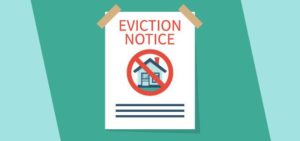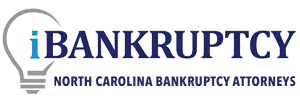How Can Bankruptcy Help With Evictions in North Carolina?
Eviction and Bankruptcy In A Nutshell
Use Bankruptcy To:
1) Stop The Eviction
2) Remain In Your Home
3) Or Leave The Residence And Wipe Away Past-Due Rent
Eviction and Bankruptcy In More Detail
Bankruptcy can be used to assist you with an eviction you are facing or may face in the near future. Falling behind on rent can be a very stressful situation. You and your family could be forced to move out of the place you call home on short notice. Below I will describe the eviction process in North Carolina. Then I will discuss the ways in which bankruptcy can solve your “eviction problem”.
The Eviction Process In North Carolina

The eviction process in North Carolina is governed by the statutes of North Carolina found under Chapter 42 Article 3 (you can read the statute by clicking here). Evictions in North Carolina are actually referred to as “Summary Ejectment.” So, do not let that wording confuse you.
The two parties involved in an eviction are the Landlord and the Renter. Obviously, the Landlord is the one who owns the property and the one to whom rent is paid. The Renter is the one who occupies the property and pays rent to the Landlord.
A Landlord cannot simply evict a Renter for no reason. Rather the Law has established a few situations in which a Renter can be evicted:
- The Renter fails to pay rent. (The most common reason for eviction)
- The Renter remains on the property despite the term of the lease ending.
- The Renter engages in criminal activity on the property.
- The Renter breaches the terms of the lease agreement.
If a Renter falls behind on rent, then before starting the eviction court proceeding the Landlord must send to the Renter a letter demanding rent. This letter must be sent at least 10 days prior to the institution of the court action. Typically, this letter will be sent via certified mail (although this is not a requirement) in order to provide proof that the letter was sent.
After the 10 day period expires and if rent has still not been paid, then the Landlord will file the eviction court proceeding (again referred to as Summary Ejectment). The Landlord will file a Complaint, and the Clerk of Court will issue a Summons. The Complaint and Summons must be served upon the Renter. Service is typically performed by the Sheriff.
Along with the Summons and Complaint the Renter will also receive notice of the date the court hearing. This court hearing will be held as soon as 7 days after the Summons was issued by the Clerk and will be held in front of a Magistrate (not typically a judge). Both the Renter and the Landlord will be given an opportunity to present their side of the story. After hearing both arguments, the Magistrate will decide to grant or deny the eviction.
If the Magistrate rules in favor of the Landlord and grants the eviction, then the Renter will have 10 days from the court hearing date to remove himself and his property from the residence. If the Renter fails to do so, then the sheriff will assist him in doing so.
Bankruptcy VS. Eviction
If a Renter falls behind on rent and is facing an eviction, then bankruptcy can be used as a means to solve his eviction problem. Both Chapter 7 and Chapter 13 have benefits to the Renter. The type of case filed depends on the Renter’s goal.
Option 1: Use Chapter 13 Bankruptcy To Stop The Eviction And Remain In The Home.
Chapter 13 bankruptcy is a payment plan entered into where the individual makes one monthly debt payment to pay  for all of his debts (read more about Chapter 13 here). A Renter who falls behind on his rent payments can file a Chapter 13 bankruptcy and stop the eviction before the eviction judgment is entered. Through his Chapter 13 plan payments, the Renter pays for and cures the past due rent. But the Renter must remain current on his monthly rent beginning the month his case is filed and every month during the pendency of his Chapter 13.
for all of his debts (read more about Chapter 13 here). A Renter who falls behind on his rent payments can file a Chapter 13 bankruptcy and stop the eviction before the eviction judgment is entered. Through his Chapter 13 plan payments, the Renter pays for and cures the past due rent. But the Renter must remain current on his monthly rent beginning the month his case is filed and every month during the pendency of his Chapter 13.
EXAMPLE: Renter pays $500 per month to Landlord for rent. Renter has failed to pay rent for 4 months ($2,000 in arrears). Landlord files a Complaint for Summary Ejectment and has it served on Renter. Renter decides to file Chapter 13 to keep from being evicted. Through his Chapter 13 payment, Renter pays the $2,000 in past due rent (equal to $34/month in a 60 month bankruptcy). Renter pays the $500 monthly rent to Landlord each month it comes due during his case. At the conclusion of Renter’s bankruptcy he is no longer behind on his rent.
Option 2: Use Chapter 7 or Chapter 13 To Temporarily Halt The Eviction, Wipe Away Past-Due Rent, And Find A New Place To Live.
Many Renters who fall behind on their rent have soured their relationship with the Landlord and would rather move to a new residence than remain in their current one. Either Chapter 7 or Chapter 13 bankruptcy can be used to assist the Renter.
For a Renter who desires a new location to live, Chapter 7 (read more about Chapter 7 Bankruptcy here) can help him in the following ways:
- The Renter can discharge (i.e. wipe away) his liability for past-due rent.
- The Renter can reject and terminate the lease with the Landlord and not be held liable for any future rent.
- The Chapter 7 filing will cause a pending eviction proceeding to halt for a period of time (up to 4 months). But, keep in mind, that a Landlord can seek approval from the bankruptcy court to proceed with the eviction during the bankruptcy.
EXAMPLE: Landlord files an eviction proceeding against Renter due to past due rent ($2,000 in arrears). Prior to the eviction judgment being entered, Renter files a Chapter 7 bankruptcy. The eviction process is halted, and Renter finds a new place to live. The past due rent is discharged (wiped away). The lease between Renter and Landlord is terminated, and Renter is not liable for any future rent.
Chapter 13 bankruptcy can also assist the Renter in this situation in the following ways:
- The Renter can discharge (i.e. wipe away) his liability for past-due rent. The past-due rent will be treated as an unsecured debt and paid accordingly. For many Renters, they will not pay anything through their monthly Chapter 13 payment towards the past due rent.
- The Renter can reject and terminate the lease with the Landlord and not be held liable for any future rent.
- The Chapter 13 filing will cause the pending eviction proceeding to halt. But, the Renter should immediately find a new residence.
EXAMPLE: Renter is 6 months behind on his rent ($3,000 in arrears) and files a Chapter 13 bankruptcy. The Renter pays $0 toward the past-due rent through his monthly Chapter 13 payment. The lease between Renter and Landlord is rejected/terminated. At the conclusion of his bankruptcy, the past-due rent is discharged (i.e. wiped away).
IMPORTANT NOTE Regarding The Eviction Moratorium In North Carolina Expiring June 30, 2021
The Governor of North Carolina has instituted a moratorium preventing evictions from occurring (read The Governor’s Executive Order here). On June 30, 2021 this moratorium ends and Landlords will again be allowed to evict individuals for past-due rent.
If you have fallen behind in your rent over the past several months, then you need to begin planning how to achieve your goal. Do you want to remain in your current residence and cure your past-due rent? Or do you want to move to a new residence and wipe away your past-due rent?
Renters facing this dilemma should include in their planning process a free consultation with me to discuss the option of bankruptcy. You can begin the consultation right now by filling out my online intake form. I will review your information and get back with you in a matter of hours.
